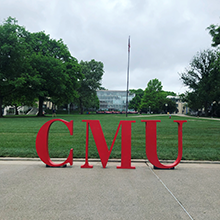
Services and Tools for Opening Research and Scholarship to All
At Carnegie Mellon University Libraries, democratizing participation in and access to the scholarly record is at the heart of what we do. We champion open research outputs, processes, and communities, and provide a range of tools and services that help researchers integrate open at every stage of the scholarly lifecycle. Opening up research increases impact, enhances collaboration, accelerates discovery, and improves learning outcomes.
Why Open?
Openness isn’t just about removing barriers to reading scholarship, but also removing barriers to producing it. It’s about asking questions about whose work we engage with and in what forms, about whose work we amplify and assign in courses. It’s about who we collaborate with, the labor we’re crediting, the content matter we’re bringing to light. It’s about asking questions about the platforms we choose to use, and about creating open and inclusive communities, and designing for accessibility. It’s about creating transparent budget models and machine-readable metadata. It’s about always asking ourselves who gets to create and speak and be read and heard and who gets to consume—about who doesn’t take part, why that might be, and how we can elevate their voices.
We support open with the following services and by financially investing in the infrastructure and communities that help make research publicly accessible and reusable for all. You can view our investments on our Open Investments page.
Doing Open Research at CMU
Publishing Open Access Scholarship:
The Carnegie Mellon University Libraries support Open Access publishing in many ways. Our efforts to promote Open Access publishing on campus include negotiating special publisher agreements, providing funds for Article Processing Charges (APCs), hosting repository platforms for sharing scholarly output, and providing development and hosting services for journals and digital projects.
Using and Creating Open Source Software:
The CMU OSPO provides consultation, services, and tools to help identify, manage, curate, and share open source software. The OSPO acts as a community convener within CMU and engages with the broader open source community to track, learn, and adapt best practices. The OSPO provides support for grant proposals and helps projects build community, governance models and sustainability.
Doing Transparent and Reproducible Research
The Open Science & Data Collaborations Program supports transparent and reproducible research in any discipline by providing access to tools and training. We recognize that having well documented and automated research workflows, code, and datasets is essential to making research more interdisciplinary, efficient, and reusable.
Opening Up Your Dissertation
Carnegie Mellon’s Student Handbook requires that graduate students submit a copy of their thesis or dissertation to the University Libraries. These are then published (embargoes are available) on KiltHub, a free, open access repository of CMU research, as well as in ProQuest Dissertations & Theses, a commercial database of dissertations.
Sharing Your Data
Researchers are increasingly required to share data as well as publications resulting from funded research. CMU Libraries can help you: create a data management and sharing plan; prepare data for deposit so that it is FAIR; document your data according to best practices in your field; find the most suitable repository for your data; understand and apply the appropriate license for reuse.
Creating Open Publications
The Libraries Publishing Service (LPS) supports scholarly journals, online exhibitions, and other open access digital projects to promote learning, share research, and engage a wider public audience.
Glossary of Library-Supported Tools and Resources for Working in the Open
Code Ocean is a platform that replicates a computational environment and allows you to share and run code without installing coding packages on our computer.
Command Line Interface is a means of using text-based commands to view, handle, and manipulate files on your computer and automating tasks.
DMPtool is an online platform providing ready-to-use templates for creating data management plans to be used in grant submissions for funding agencies, including the National Science Foundation, National Endowment for the Humanities, the Department of Defense, and many more.
A DOI is a unique digital identifier for research output (code, a dataset, a publication, a podcast, etc.) that does not change and can be versioned. CMU Libraries supports DOI minting through its Kilthub repository and, for editors publishing journals through the Library Publishing Service, through Datacite.
Git is a free and open source version control system for tracking changes in code. Git repositories can be hosted on GitHub.
An ISSN or International Standard Serial Number is a unique code assigned to a serial publication (e.g. magazine, conference proceedings, etc.). The Library Publishing Service can assist with ISSN registration for its journals.
Janeway is a publishing platform for journals and similar content. Its interface coordinates users across the process of manuscript submission, peer review, editing, typesetting, and publication. Hosted by the Library Publishing Service, Janeway-based websites also serve as the public face for these journals, where readers can access and share articles.
Jupyter Notebooks is a free and open source interactive computational environment that can contain executable code and visualizations. It can be used to document and demonstrate coding workflows.
KiltHub is a comprehensive institutional repository, maintained by the University Libraries and hosted on the figshare platform, where Carnegie Mellon University researchers can share the scholarly outputs and research data. KiltHub curates, collects, preserves, and provides open access to this material as part of the Libraries' commitment to open scholarship and collaboration.
LabArchives is an electronic research notebook that can be used to store research notes and data securely in the cloud.
Matomo is an open source web analytics platform that offers 100% data ownership and data protection. LPS supports Matomo for all of its hosted projects. Additional activity monitoring is available directly through the Janeway system for LPS journals.
OpenRefine is a free and open source data cleaning platform. Messy data can be cleaned and transformed without programming knowledge.
Open Science Framework is a cloud-based research management platform that can be used to store project materials, share research with collaborators, and preregister research.
An ORCiD ID is a persistent digital identifier (like a DOI for researchers) that uniquely identifies you and your research to funders, journals, and university applications such as Scholars at CMU.
OverLeaf is a collaborative, online LaTeX editor designed to make the process of writing, editing and producing your research papers and project reports much quicker for both you and your collaborators. CMU Libraries provides Overleaf Pro for current institutional affiliates.
protocols.io is a cloud-based platform for documenting, versioning, and sharing step-by-step research methods.
Python is a popular free and open source coding language for working with data in any discipline.
QGIS (Quantum Geographic Information System) is a desktop-based mapping software that allows for the analysis, editing, and packaging of spatial information. Flexible and customizable, it can export, print, and publish shapefiles and geodatabases through the use of various plugins. Its functions can be compared with those of ArcGIS.
R is a popular free and open source coding language for statistical computing and working with data in any discipline.
SQL is a free and open source programming language for accessing, extracting, and manipulating data in relational databases.
Wikipedia is a free online crowdsourced encyclopedia. Anyone can create or edit content.
Zotero is a free, open source tool for helping you collect, organize, cite and share your research sources. It easily imports citation information from multiple web sources and allows for shared libraries and PDF annotation. As a CMU Affiliate, you can sign up with your Andrew ID and enjoy unlimited cloud storage for your files.
Primary Contact(s)
Publish
Publish & Share your research
Navigate the many options for publishing your research to optimize its accessibility and impact.







